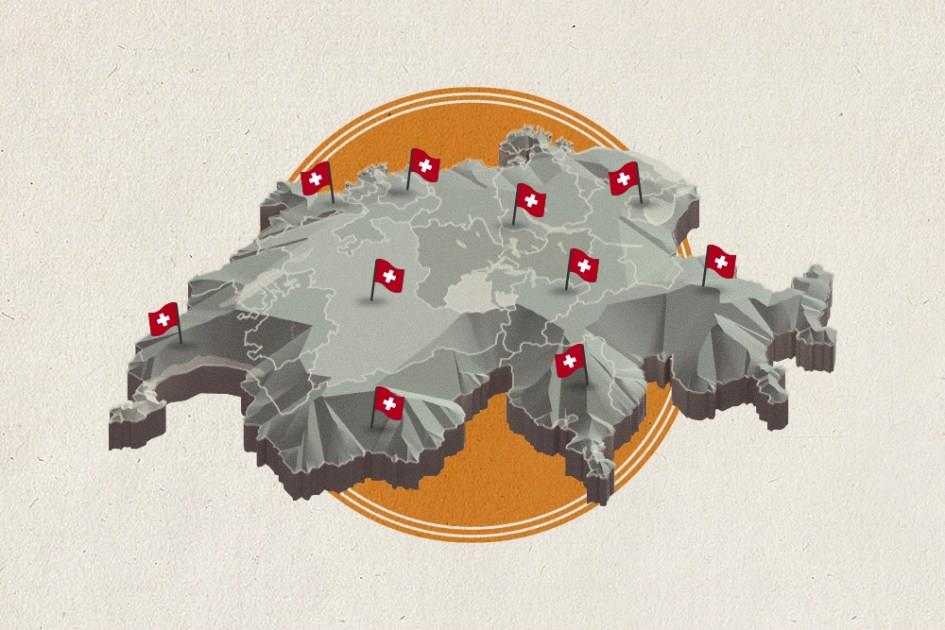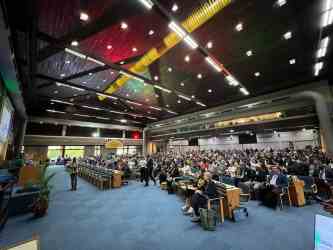
How Swiss Federalism Emerged And Shapes The Nation
As a reporter I cover developments in democracy where the Swiss perspective becomes relevant. I am Swiss and have long been fascinated by the way public discussions shape society.
- More from this auth
- German Departme
- Deutsch de Der Schweizer Föderalismus: Wie er gelebt wird und woher er kommt Original Read more: Der Schweizer Föderalismus: Wie er gelebt wird und woher er komm
- Français fr Le fédéralisme suisse: ses origines et sa perception par la population Read more: Le fédéralisme suisse: ses origines et sa perception par la populatio
- Italiano it Il federalismo svizzero: da dove arriva e come viene vissuto Read more: Il federalismo svizzero: da dove arriva e come viene vissut
- Español es El federalismo suizo: cómo funciona y de dónde procede Read more: El federalismo suizo: cómo funciona y de dónde proced
- Português pt Federalismo suíço: como é vivido e de onde vem Read more: Federalismo suíço: como é vivido e de onde ve
- 日本語 ja 小さな州が国を動かす? スイス連邦制のしくみと歴史 Read more: 小さな州が国を動かす? スイス連邦制のしくみと歴
- العربية ar النظام الفدرالي في سويسرا: كيف نشأ وكيف تطوّر؟ Read more: النظام الفدرالي في سويسرا: كيف نشأ وكيف تطوّر
- 中文 zh 瑞士的联邦制怎样运行,从何而来? Read more: 瑞士的联邦制怎样运行,从何而来
Swiss federalism is a cornerstone of the Swiss political system.
A country of four languages, Switzerland sees itself as a nation built on political will and consensus, rather than one defined by shared culture or ethnicity.
But the building blocks of the modern Swiss state are set in a patchwork of medieval alliances between cantons and villages. The Latin word foedus – meaning“covenant” or“alliance” – gave rise to the term“federal,” and captures the spirit of compromise that underpins Swiss statehood.
After a brief civil war, Switzerland was reconstituted as a federal state in 1848. What had been a confederation of states was transformed into a federation – a change opposed by the war's losers, the small conservative cantons.
The decision to adopt a federal structure was a concession to these conservatives. It was a way to ensure their interests would continue to be represented within the new political system.
Federalism deeply rooted in Swiss societyFederalism is something the Swiss still take pride in today. A 2021 Australian studyExternal link compared how strongly people in both decentralised and more centralised countries support the core principles of federalism. On average, the study found that found that support for the values of a federal constitution was strongest in Switzerland and weakest in Belgium.
Nowhere was the belief more firmly held than in Switzerland that all parts of a country should have a say in national matters.
External ContentAnother strong conviction for the Swiss, though slightly weaker than in Germany, is the belief that different levels of government should work together while also maintaining a clear separation of responsibilities.
The principle of subsidiarity and cantonal authorityThe Swiss federal state is divided into 26 cantons and more than 2,100 municipalities. The country has three political levels: the federal government, the cantons, and the municipalities. As in other federal states – such as Canada, the United States, or Brazil – the principle of subsidiarity applies.
This means that municipalities are free to manage their own affairs, within the framework of cantonal and federal law. If municipalities are unable to handle certain responsibilities, they are taken over by the canton, or if necessary, by the federal government. In turn, the cantons are free to act wherever they are not restricted by legislation at the national level.
External ContentMunicipalities defend their interests vis-à-vis the higher level, just as the cantons do in relation to the federal government.
The Swiss constitution stipulates that the cantons“participate in the federal decision-making process”. Political scientist Rahel Freiburghaus describes, in her dissertation, how cantons sometimes seek to assert their own interests through what she calls“cantonal lobbying that chips away at the federal constitution”.
The phrase“cantonal authority” appeared in public discourse most recently during the Covid-19 pandemic. At times, you could walk past shuttered restaurants in Basel on your way to the train station, only to find people drinking mulled wine in Bern an hour later.
During certain phases of the pandemic, the cantons were free to decide on closures and other public health measures independently.
External Content The cantons' majorityMeanwhile, cantons exercised their federal rights in a way that had not been seen since the 1950sExternal link . At the end of November 2020, a popular initiative failed because it did not win the support of a majority of the cantons. The Responsible Business Initiative sought to hold Swiss companies liable for human rights violations committed abroad.
The initiative was supported by a narrow majority of voters. It failed to pass because it won approval in only a minority of cantons.
External ContentEvery constitutional amendment – including mandatory referendums – must win not only a majority of the popular vote, but also majorities in more than half of the 26 cantons.
Until the 19th century, before Switzerland's modern era, all national matters were decided by cantonal majority. This means that all matters which affected the whole of Switzerland were decided by what the majority of the cantons wanted.
This cantonal majority in referendums and the Senate are two institutions, in place since the founding of the federal state in 1848, which give smaller cantons leverage to defend their interests.
More More Our democracy newsletterIf you are a fan of democracy, then you've come to the right place. We report on the latest democratic developments, debates and challenges.
Read more: Our democracy newslette
Legal Disclaimer:
MENAFN provides the
information “as is” without warranty of any kind. We do not accept
any responsibility or liability for the accuracy, content, images,
videos, licenses, completeness, legality, or reliability of the information
contained in this article. If you have any complaints or copyright
issues related to this article, kindly contact the provider above.






















Comments
No comment